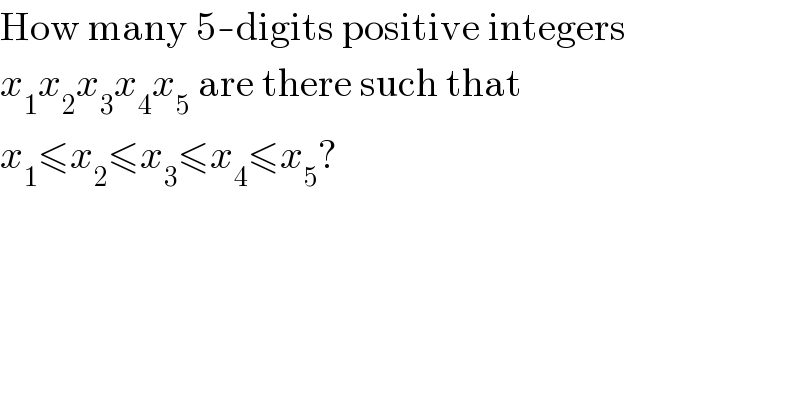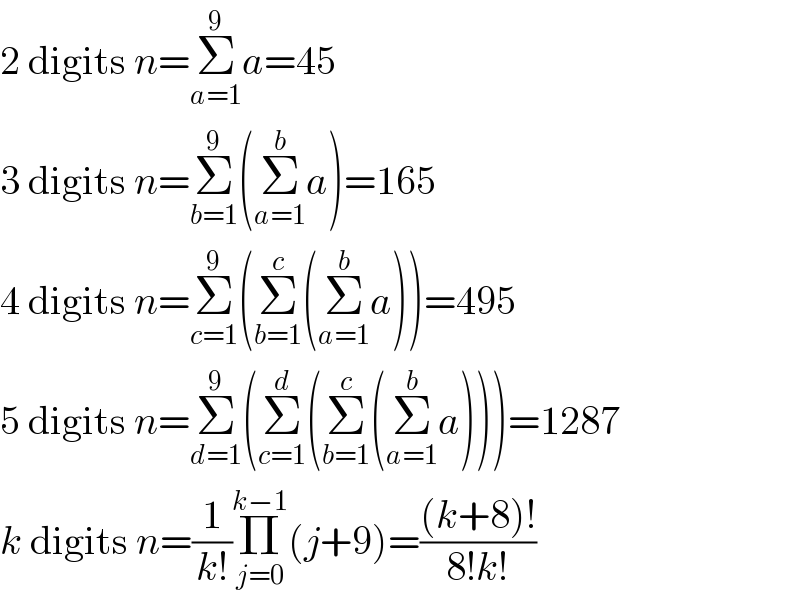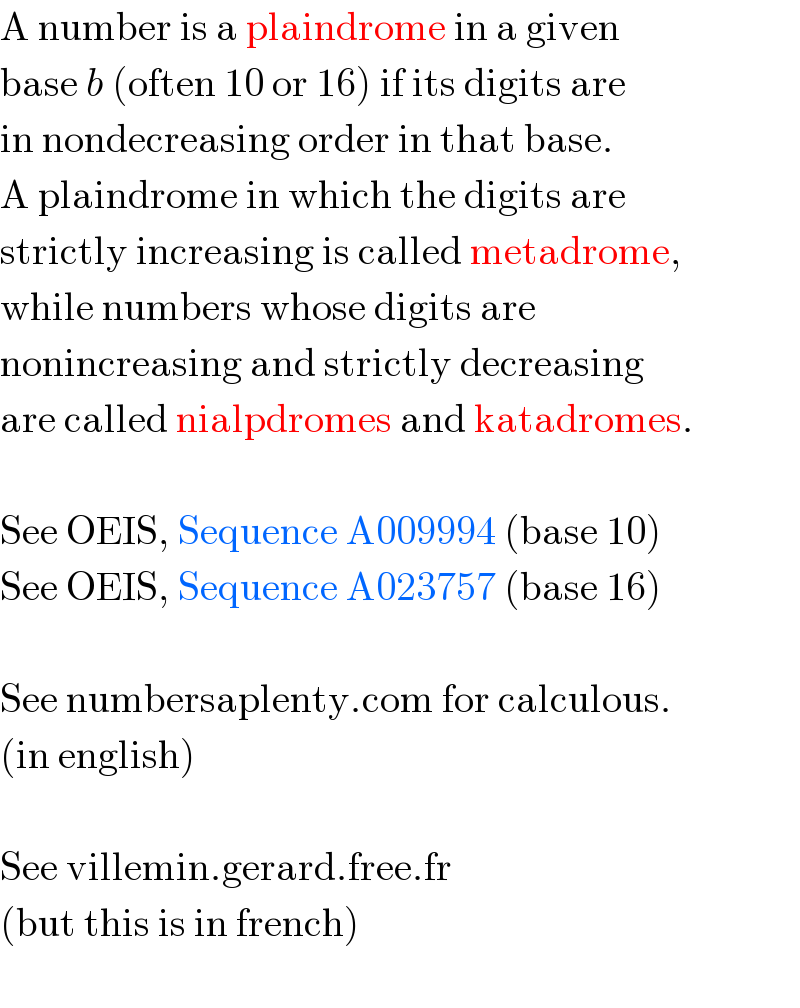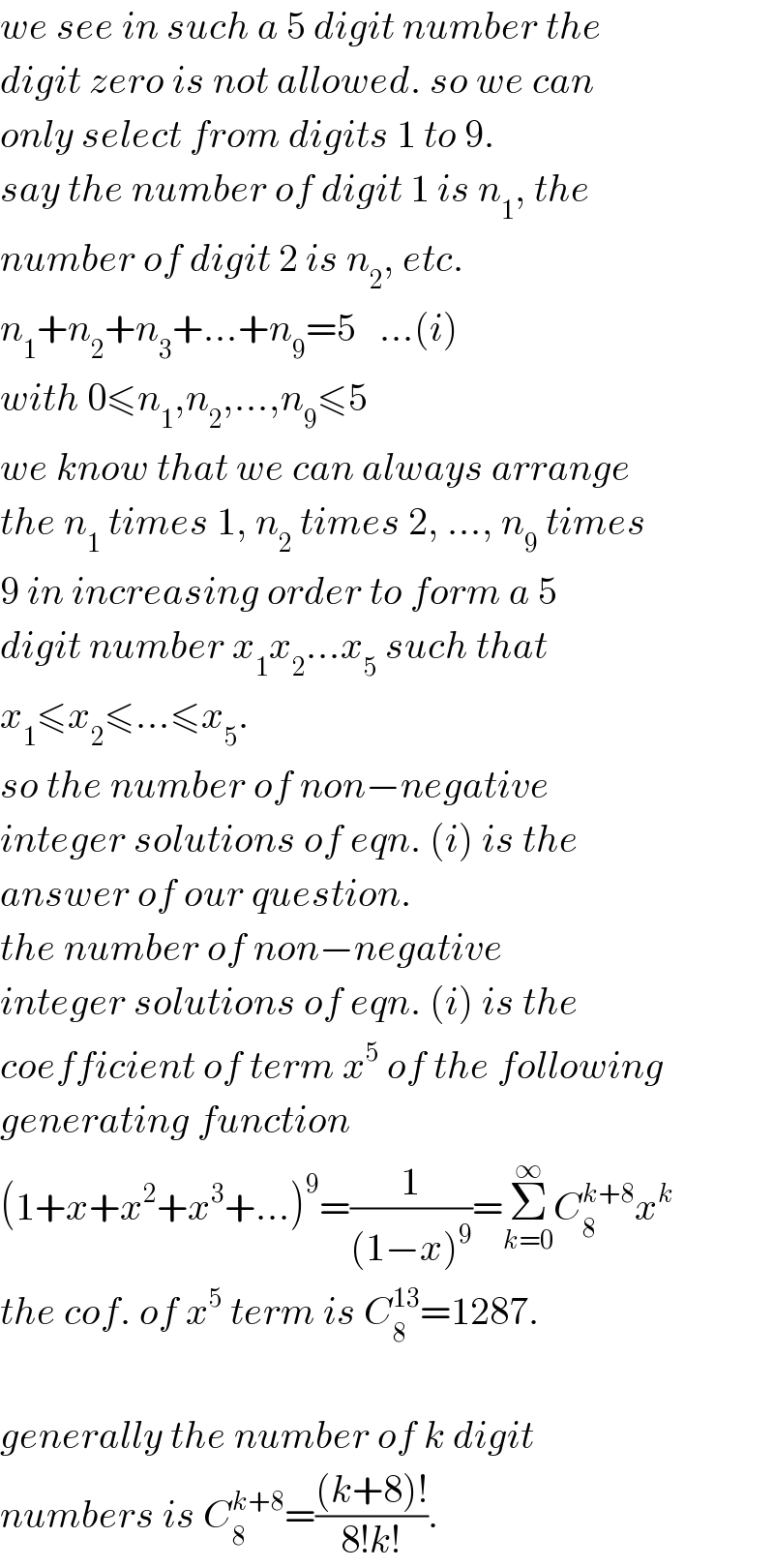
Question Number 117061 by ZiYangLee last updated on 09/Oct/20

$$\mathrm{How}\:\mathrm{many}\:\mathrm{5}-\mathrm{digits}\:\mathrm{positive}\:\mathrm{integers} \\ $$$${x}_{\mathrm{1}} {x}_{\mathrm{2}} {x}_{\mathrm{3}} {x}_{\mathrm{4}} {x}_{\mathrm{5}} \:\mathrm{are}\:\mathrm{there}\:\mathrm{such}\:\mathrm{that}\: \\ $$$${x}_{\mathrm{1}} \leqslant{x}_{\mathrm{2}} \leqslant{x}_{\mathrm{3}} \leqslant{x}_{\mathrm{4}} \leqslant{x}_{\mathrm{5}} ? \\ $$
Commented by ZiYangLee last updated on 09/Oct/20

$${nope}\:{is}\:\mathrm{715}\:{instead} \\ $$
Commented by MJS_new last updated on 09/Oct/20

$$\mathrm{2}\:\mathrm{digits}\:{n}=\underset{{a}=\mathrm{1}} {\overset{\mathrm{9}} {\sum}}{a}=\mathrm{45} \\ $$$$\mathrm{3}\:\mathrm{digits}\:{n}=\underset{{b}=\mathrm{1}} {\overset{\mathrm{9}} {\sum}}\left(\underset{{a}=\mathrm{1}} {\overset{{b}} {\sum}}{a}\right)=\mathrm{165} \\ $$$$\mathrm{4}\:\mathrm{digits}\:{n}=\underset{{c}=\mathrm{1}} {\overset{\mathrm{9}} {\sum}}\left(\underset{{b}=\mathrm{1}} {\overset{{c}} {\sum}}\left(\underset{{a}=\mathrm{1}} {\overset{{b}} {\sum}}{a}\right)\right)=\mathrm{495} \\ $$$$\mathrm{5}\:\mathrm{digits}\:{n}=\underset{{d}=\mathrm{1}} {\overset{\mathrm{9}} {\sum}}\left(\underset{{c}=\mathrm{1}} {\overset{{d}} {\sum}}\left(\underset{{b}=\mathrm{1}} {\overset{{c}} {\sum}}\left(\underset{{a}=\mathrm{1}} {\overset{{b}} {\sum}}{a}\right)\right)\right)=\mathrm{1287} \\ $$$${k}\:\mathrm{digits}\:{n}=\frac{\mathrm{1}}{{k}!}\underset{{j}=\mathrm{0}} {\overset{{k}−\mathrm{1}} {\prod}}\left({j}+\mathrm{9}\right)=\frac{\left({k}+\mathrm{8}\right)!}{\mathrm{8}!{k}!} \\ $$
Commented by MJS_new last updated on 09/Oct/20

$$\mathrm{how}\:\mathrm{you}\:\mathrm{get}\:\mathrm{715}? \\ $$
Answered by Olaf last updated on 09/Oct/20

$$\mathrm{A}\:\mathrm{number}\:\mathrm{is}\:\mathrm{a}\:\mathrm{plaindrome}\:\mathrm{in}\:\mathrm{a}\:\mathrm{given} \\ $$$$\mathrm{base}\:{b}\:\left(\mathrm{often}\:\mathrm{10}\:\mathrm{or}\:\mathrm{16}\right)\:\mathrm{if}\:\mathrm{its}\:\mathrm{digits}\:\mathrm{are} \\ $$$$\mathrm{in}\:\mathrm{nondecreasing}\:\mathrm{order}\:\mathrm{in}\:\mathrm{that}\:\mathrm{base}. \\ $$$$\mathrm{A}\:\mathrm{plaindrome}\:\mathrm{in}\:\mathrm{which}\:\mathrm{the}\:\mathrm{digits}\:\mathrm{are} \\ $$$$\mathrm{strictly}\:\mathrm{increasing}\:\mathrm{is}\:\mathrm{called}\:\mathrm{metadrome}, \\ $$$$\mathrm{while}\:\mathrm{numbers}\:\mathrm{whose}\:\mathrm{digits}\:\mathrm{are}\: \\ $$$$\mathrm{nonincreasing}\:\mathrm{and}\:\mathrm{strictly}\:\mathrm{decreasing} \\ $$$$\mathrm{are}\:\mathrm{called}\:\mathrm{nialpdromes}\:\mathrm{and}\:\mathrm{katadromes}. \\ $$$$ \\ $$$$\mathrm{See}\:\mathrm{OEIS},\:\mathrm{Sequence}\:\mathrm{A009994}\:\left(\mathrm{base}\:\mathrm{10}\right) \\ $$$$\mathrm{See}\:\mathrm{OEIS},\:\mathrm{Sequence}\:\mathrm{A023757}\:\left(\mathrm{base}\:\mathrm{16}\right) \\ $$$$ \\ $$$$\mathrm{See}\:\mathrm{numbersaplenty}.\mathrm{com}\:\mathrm{for}\:\mathrm{calculous}. \\ $$$$\left(\mathrm{in}\:\mathrm{english}\right) \\ $$$$ \\ $$$$\mathrm{See}\:\mathrm{villemin}.\mathrm{gerard}.\mathrm{free}.\mathrm{fr} \\ $$$$\left(\mathrm{but}\:\mathrm{this}\:\mathrm{is}\:\mathrm{in}\:\mathrm{french}\right) \\ $$$$ \\ $$
Answered by mr W last updated on 11/Oct/20

$${we}\:{see}\:{in}\:{such}\:{a}\:\mathrm{5}\:{digit}\:{number}\:{the} \\ $$$${digit}\:{zero}\:{is}\:{not}\:{allowed}.\:{so}\:{we}\:{can} \\ $$$${only}\:{select}\:{from}\:{digits}\:\mathrm{1}\:{to}\:\mathrm{9}. \\ $$$${say}\:{the}\:{number}\:{of}\:{digit}\:\mathrm{1}\:{is}\:{n}_{\mathrm{1}} ,\:{the} \\ $$$${number}\:{of}\:{digit}\:\mathrm{2}\:{is}\:{n}_{\mathrm{2}} ,\:{etc}. \\ $$$${n}_{\mathrm{1}} +{n}_{\mathrm{2}} +{n}_{\mathrm{3}} +...+{n}_{\mathrm{9}} =\mathrm{5}\:\:\:...\left({i}\right) \\ $$$${with}\:\mathrm{0}\leqslant{n}_{\mathrm{1}} ,{n}_{\mathrm{2}} ,...,{n}_{\mathrm{9}} \leqslant\mathrm{5} \\ $$$${we}\:{know}\:{that}\:{we}\:{can}\:{always}\:{arrange} \\ $$$${the}\:{n}_{\mathrm{1}} \:{times}\:\mathrm{1},\:{n}_{\mathrm{2}} \:{times}\:\mathrm{2},\:...,\:{n}_{\mathrm{9}} \:{times} \\ $$$$\mathrm{9}\:{in}\:{increasing}\:{order}\:{to}\:{form}\:{a}\:\mathrm{5} \\ $$$${digit}\:{number}\:{x}_{\mathrm{1}} {x}_{\mathrm{2}} ...{x}_{\mathrm{5}} \:{such}\:{that} \\ $$$${x}_{\mathrm{1}} \leqslant{x}_{\mathrm{2}} \leqslant...\leqslant{x}_{\mathrm{5}} . \\ $$$${so}\:{the}\:{number}\:{of}\:{non}−{negative} \\ $$$${integer}\:{solutions}\:{of}\:{eqn}.\:\left({i}\right)\:{is}\:{the} \\ $$$${answer}\:{of}\:{our}\:{question}. \\ $$$${the}\:{number}\:{of}\:{non}−{negative}\: \\ $$$${integer}\:{solutions}\:{of}\:{eqn}.\:\left({i}\right)\:{is}\:{the} \\ $$$${coefficient}\:{of}\:{term}\:{x}^{\mathrm{5}} \:{of}\:{the}\:{following} \\ $$$${generating}\:{function} \\ $$$$\left(\mathrm{1}+{x}+{x}^{\mathrm{2}} +{x}^{\mathrm{3}} +...\right)^{\mathrm{9}} =\frac{\mathrm{1}}{\left(\mathrm{1}−{x}\right)^{\mathrm{9}} }=\underset{{k}=\mathrm{0}} {\overset{\infty} {\sum}}{C}_{\mathrm{8}} ^{{k}+\mathrm{8}} {x}^{{k}} \\ $$$${the}\:{cof}.\:{of}\:{x}^{\mathrm{5}} \:{term}\:{is}\:{C}_{\mathrm{8}} ^{\mathrm{13}} =\mathrm{1287}. \\ $$$$ \\ $$$${generally}\:{the}\:{number}\:{of}\:{k}\:{digit} \\ $$$${numbers}\:{is}\:{C}_{\mathrm{8}} ^{{k}+\mathrm{8}} =\frac{\left({k}+\mathrm{8}\right)!}{\mathrm{8}!{k}!}. \\ $$
Commented by mr W last updated on 11/Oct/20

